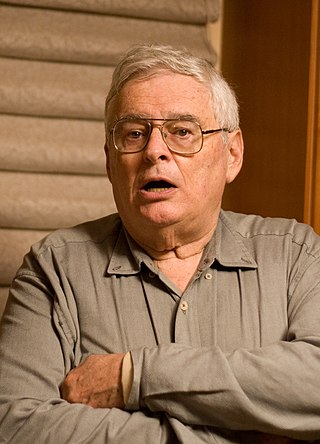Essentialism is the view that objects have a set of attributes that are necessary to their identity. In early Western thought, Plato's idealism held that all things have such an "essence"—an "idea" or "form". In Categories, Aristotle similarly proposed that all objects have a substance that, as George Lakoff put it, "make the thing what it is, and without which it would be not that kind of thing". The contrary view—non-essentialism—denies the need to posit such an "essence".
Categorization is a type of cognition involving conceptual differentiation between characteristics of conscious experience, such as objects, events, or ideas. It involves the abstraction and differentiation of aspects of experience by sorting and distinguishing between groupings, through classification or typification on the basis of traits, features, similarities or other criteria that are universal to the group. Categorization is considered one of the most fundamental cognitive abilities, and it is studied particularly by psychology and cognitive linguistics.

Jerry Alan Fodor was an American philosopher and the author of many crucial works in the fields of philosophy of mind and cognitive science. His writings in these fields laid the groundwork for the modularity of mind and the language of thought hypotheses, and he is recognized as having had "an enormous influence on virtually every portion of the philosophy of mind literature since 1960." At the time of his death in 2017, he held the position of State of New Jersey Professor of Philosophy, Emeritus, at Rutgers University, and had taught previously at the City University of New York Graduate Center and MIT.
Distributed cognition is an approach to cognitive science research that was developed by cognitive anthropologist Edwin Hutchins during the 1990s.
Social representations are a system of values, ideas, metaphors, beliefs, and practices that serve to establish social order, orient participants and enable communication among the members of groups and communities. Social representation theory is a body of theory within social psychology and sociological social psychology. It has parallels in sociological theorizing such as social constructionism and symbolic interactionism, and is similar in some ways to mass consensus and discursive psychology.

Representation is the use of signs that stand in for and take the place of something else. It is through representation that people organize the world and reality through the act of naming its elements. Signs are arranged in order to form semantic constructions and express relations.

Serge Moscovici was a Romanian-born French social psychologist, director of the Laboratoire Européen de Psychologie Sociale, which he co-founded in 1974 at the Maison des sciences de l'homme in Paris. He was a member of the European Academy of Sciences and Arts and Officer of the Légion d'honneur, as well as a member of the Russian Academy of Sciences and honorary member of the Hungarian Academy of Sciences. Moscovici's son, Pierre Moscovici, was European Commissioner for Economic and Financial Affairs, Taxation and Customs.
A mental representation, in philosophy of mind, cognitive psychology, neuroscience, and cognitive science, is a hypothetical internal cognitive symbol that represents external reality or its abstractions.
Enactivism is a position in cognitive science that argues that cognition arises through a dynamic interaction between an acting organism and its environment. It claims that the environment of an organism is brought about, or enacted, by the active exercise of that organism's sensorimotor processes. "The key point, then, is that the species brings forth and specifies its own domain of problems ...this domain does not exist "out there" in an environment that acts as a landing pad for organisms that somehow drop or parachute into the world. Instead, living beings and their environments stand in relation to each other through mutual specification or codetermination" (p. 198). "Organisms do not passively receive information from their environments, which they then translate into internal representations. Natural cognitive systems...participate in the generation of meaning ...engaging in transformational and not merely informational interactions: they enact a world." These authors suggest that the increasing emphasis upon enactive terminology presages a new era in thinking about cognitive science. How the actions involved in enactivism relate to age-old questions about free will remains a topic of active debate.
Sandra Jovchelovitch, from Porto Alegre, Brazil, is a social psychologist, currently Professor of Social Psychology and Director of the MSc program in Social and Cultural Psychology at the Institute of Social Psychology at the London School of Economics (LSE), of which she has served as head since August 2007. Dr. Jovchelovitch is co-editor of the Journal of Community and Applied Social Psychology and directs a book series on Contemporary Social Psychology for the Brazilian publishing house Vozes. She also serves on the editorial boards of the European Journal of Social Psychology and Psicologia e Sociedade. She has held appointments at the Maison de Sciences de l'Homme, under the auspices of CNPq and also teaches regularly in Brazil, being on the faculty of the Federal University of Rio Grande do Sul (UFRGS).

George Gaskell is a British Emeritus Professor of Social Psychology at the London School of Economics and Political Science (LSE). Formerly Director of the Methodology Institute, which he established with Colm O’Muircheartaigh, he was Pro-director for Planning and Resources and a member of the LSE Council and Court of Governors.
Martin W. Bauer is a Professor of social psychology. He directs the MSc in Social and Public Communication at the Department of Psychological and Behavioural Science at LSE. Martin Bauer was a Research Fellow in 'Public Understanding of Science' at the Science Museum in London, an academic visitor to the Maison des Sciences de l'homme in Paris, and he teaches regularly in Brazil at the Universidade Federal do Rio Grande do Sul and the Pontifícia Universidade Católica do Rio Grande do Sul.
Societal psychology is a development within social psychology which emphasizes the all-embracing force of the social, institutional, and cultural environments, and with it the study of social phenomena in their own right as they affect, and are affected by, the members of the particular society. The term societal psychology was coined by Hilde Himmelweit and George Gaskell in 1990, in preference to sociological social psychology, to avoid a single alliance to one other discipline.

Wolfgang Prinz is a German cognitive psychologist. He is the director of the Max Planck Institute for Human Cognitive and Brain Sciences in Leipzig, Germany, and an internationally recognized expert in experimental psychology, cognitive psychology and philosophy of mind. He is the founder of the common coding theory between perception and action that has a significant impact in cognitive neuroscience and social cognition.
Common coding theory is a cognitive psychology theory describing how perceptual representations and motor representations are linked. The theory claims that there is a shared representation for both perception and action. More important, seeing an event activates the action associated with that event, and performing an action activates the associated perceptual event.
Cognitive polyphasia is where different kinds of knowledge, possessing different rationalities live side by side in the same individual or collective. From Greek: polloi "many", phasis "appearance".
Feminist post-structuralist discourse analysis (FPDA) is a method of discourse analysis based on Chris Weedon's theories of feminist post-structuralism, and developed as a method of analysis by Judith Baxter in 2003. FPDA is based on a combination of feminism and post-structuralism. While it is still evolving as a methodology, FPDA has been used by a range of international scholars of gender and language to analyse texts such as: classroom discourse, teenage girls' conversation, and media representations of gender. FPDA is an approach to analysing the discourse of spoken interaction principally.
John Maze (1923–2008) was an Associate Professor of Psychology at the University of Sydney from 1951 to 1986. Recognised for his achievements in philosophy and psychology, he was awarded a Nuffield Foundation Travelling Fellowship with the University of London in 1958, and returned there as an Honorary Research Fellow in 1980. Maze's theoretical psychology extended from analyses of psychoanalytic metapsychology, to critique of concerns of psychology research of the day, including concepts of attitude, motivation, psychological homeostasis, psychological variables and social constructionism. Drawing on processes of conceptual and logical analysis, Maze sought to draw out logical inconsistencies and conceptual confusions apparent in theoretical psychological discourse. It is the logical structure of his theory and conclusions, as a function of a long connection with Andersonian realism which renders Maze's contribution as unique in theoretical psychology.
Robert Maclaughlin Farr was a social psychologist from Northern Ireland who played an important role in promoting and developing social representation theory.
Denise Jodelet is a French social psychologist with particular expertise in social representation theory and socio-cultural psychology.





